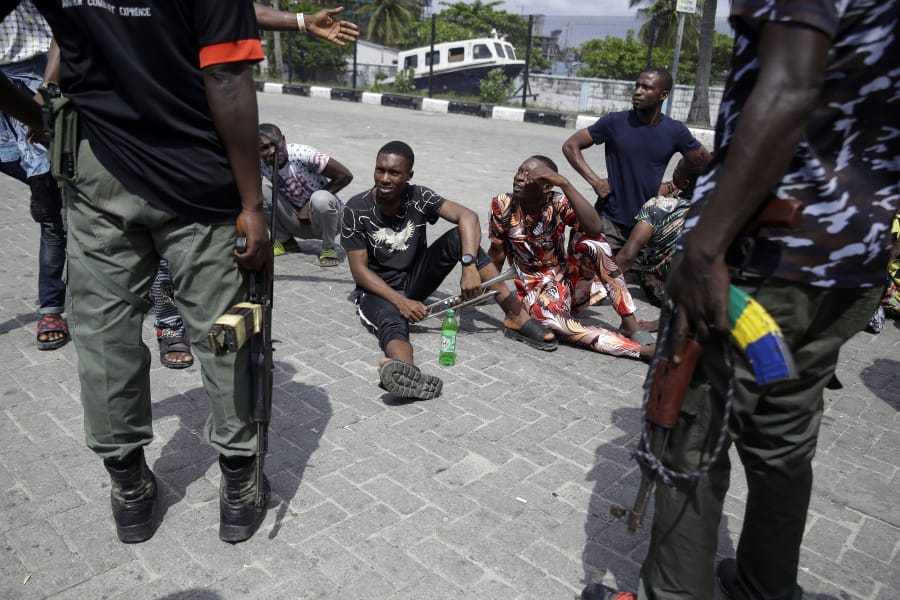LAGOS, Nigeria — Resentment lingered with the smell of charred tires Friday in Nigeria’s relatively calm streets after days of protests over police abuses, as authorities barely acknowledged reports of the military killing at least 12 peaceful demonstrators earlier this week.
President Muhammadu Buhari in his first comments on the unrest didn’t mention the shootings that sparked international outrage, instead warning protesters against being used by “subversive elements” and “undermining national security and law and order” during a national address Thursday night.
Soldiers remained in parts of Lagos, Nigeria’s largest city, on Friday. A 24-hour curfew had not yet been lifted.
One witness of Tuesday night’s deadly shooting, 33-year-old Isaiah Abor, ventured out anyway to visit the scene where soldiers opened fire on thousands of peaceful protesters holding flags and singing the national anthem. He managed to escape the chaos.
“When (the soldiers) were making comments that the flag is not bulletproof, that’s when I knew this was going to go out of hand,” Abor said. Empty ammunition shells still littered the ground.
The president’s speech annoyed him. “Look at those youths that died, at least even for the sake that they were carrying the flag alone, and the blood that stained a whole Nigerian flag, those youths were not even mentioned,” Abor said.
He added: “We are not cowards. We will always come to this ground, and we will always feel for those that are gone.”
But citing the president’s comments, one influential group behind the protests, the Feminist Coalition, urged youth to stay at home Friday, saying that “we need to stay alive to pursue our dreams to build the future.” The group said it had stopped collecting donations for the protests.
An angry crowd shouted at the governor of Lagos state over the unrest as officials toured burned-out vehicles and the sacked palace of a Lagos ceremonial leader. The leader, or oba, isn’t popular with some Nigerians who see him as a product of the country’s often corrupt politics.
Opulence and grinding poverty are in close contact in Lagos, and the inequality sharpens grievances in Nigeria, Africa’s most populous country.
Meanwhile, Buhari met with former presidents and top officials on how to move forward from some of Nigeria’s worst unrest in years.
This week’s scenes have touched a chord with Black Lives Matter supporters in the United States, while the U.S. government has strongly condemned the “use of excessive force by military forces who fired on unarmed demonstrators in Lagos, causing death and injury.”
Nigeria’s military had opened fire without warning, killing at least 12 people, according to Amnesty International.
The protests turned violent Wednesday after the shooting as mobs vandalized and burned police stations, courthouses, TV stations and a hotel. Police battled angry crowds with tear gas and gunfire. The looting and gunfire continued Thursday.
On Friday the Lagos deputy governor, Kadri Obafemi Hamzat, told a local radio station that the peaceful protests with an understandable grievance had been hijacked by hoodlums.
The demonstrations began early this month with calls for Nigeria’s government to shut down the Special Anti-Robbery Squad, a police unit known as SARS. The squad was launched to fight crime, but it carried out torture and killings, according to Amnesty International.
The #EndSARS campaign spread across the country and Buhari’s government announced that it would disband the SARS unit. The protest persisted with demonstrators calling for more widespread reforms of the police and an end to corruption.
In one attempt at calming tensions on Friday, the Lagos state government shared a list of ongoing prosecution against police officers accused of human rights abuses.
“Today seems like a good day to get on to the work of rebuilding Lagos and ending police brutality,” Gov. Babajide Sanwo-Olu said.
And yet tensions remained high. Near the scene of Tuesday’s shooting, police shouted, then fired into the air, to stop a convoy carrying the body of a Muslim who had died overnight; the cause of death was not clear.
After questioning by police, the mourners were allowed to continue, to go on and bury the dead.



